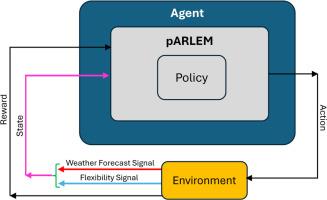通过将天气预报整合到ARLEM中,增强极端条件下的能源控制稳定性
IF 9.6
Q1 COMPUTER SCIENCE, ARTIFICIAL INTELLIGENCE
引用次数: 0
摘要
提高能源管理系统的稳定性至关重要,特别是在面临极端天气事件时。防止突然振荡的一种常见方法是实施预测模型;然而,这通常需要更复杂的模型和更强大的计算能力。在这项工作中,天气预报被整合到基于自适应强化学习的能源管理(ARLEM)方法中。由于ARLEM是一种在线无模型的基于奖励的强化学习方法,它不需要任何形式的(预测)建模,天气预报可以作为智能体环境的额外信息来源。本文以斯德哥尔摩一个典型的城市社区为例,研究了在一个有两次寒潮的冬季将天气预报纳入ARLEM的影响,并考虑了2040-2069年期间的17种未来气候情景。考虑3、6、12和24 h四个预报时段,对多个自适应政策方案进行了评估。结果表明,将天气预报纳入决策可以显著减少控制系统的波动,从而实现更稳定的能源管理。此外,它通过降低平均和峰值需求来提高能源效率,特别是在极端天气事件期间。总体而言,这有助于提高能源系统的气候适应能力。本文章由计算机程序翻译,如有差异,请以英文原文为准。

Enhancing energy control stability under extreme conditions by integrating weather forecasts into ARLEM
Increasing the stability of energy management systems is crucial, especially when facing extreme weather events. A common approach to prevent sudden oscillations is the implementation of predictive models; however, this often requires more complex models and greater computational power. In this work, weather forecasts are integrated into an approach based on Adaptive Reinforcement Learning for Energy Management (ARLEM). Since ARLEM is an online model-free reward-based RL method, it does not need any form of (predictive) modelling and weather forecasts serve as an additional source of information about the agent’s environment. The impacts of incorporating weather forecasts into ARLEM are investigated for a typical urban neighborhood in Stockholm during a winter with two cold waves and considering 17 future climate scenarios for the period of 2040–2069. Multiple adaptive policy schemes are assessed considering four forecast horizons of 3, 6, 12, and 24 h. Results show that integrating weather forecasts into decision-making can significantly reduce fluctuations in the control system, leading to more stable energy management. Moreover, it enhances energy efficiency by reducing both average and peak demands, particularly during extreme weather events. Overall, this contributes to improving the climate resilience of energy systems.
求助全文
通过发布文献求助,成功后即可免费获取论文全文。
去求助
来源期刊

Energy and AI
Engineering-Engineering (miscellaneous)
CiteScore
16.50
自引率
0.00%
发文量
64
审稿时长
56 days
 求助内容:
求助内容: 应助结果提醒方式:
应助结果提醒方式:


